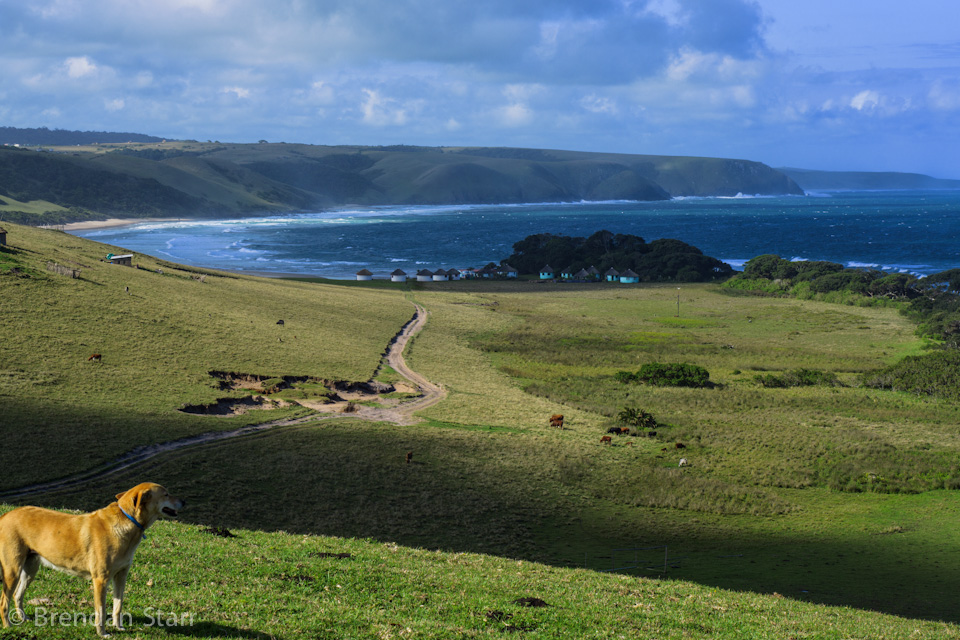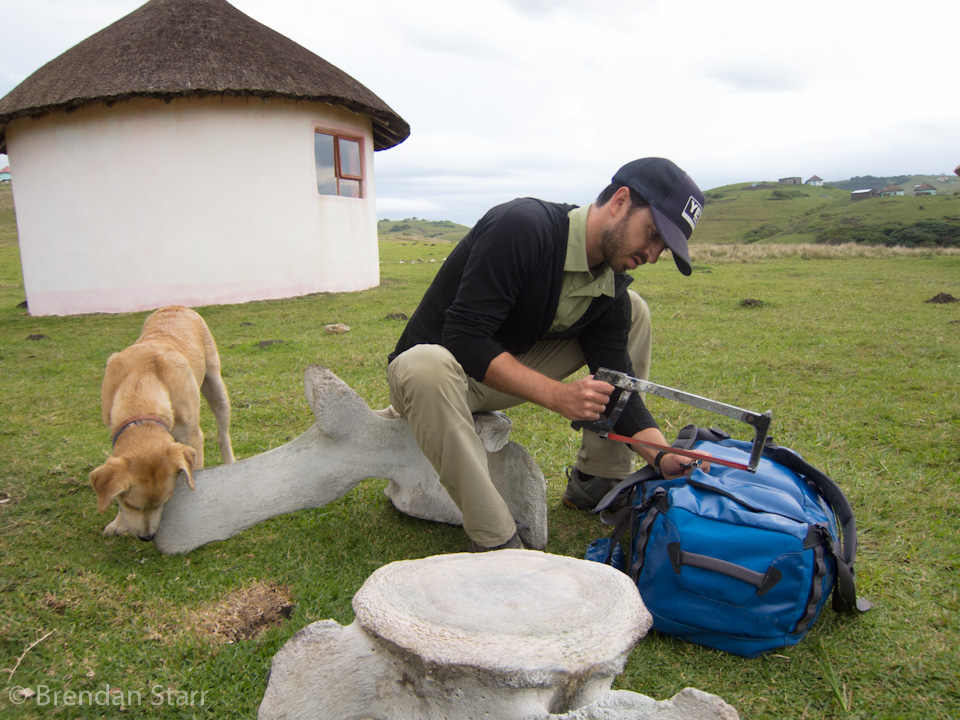The Wild Coast
Outside of spending time with Mary in the Mother City, our South Africa agenda had one major detour - a three week trip up the Eastern Cape to the Wild Coast. Like its name implies, the Wild Coast is relatively untouched and untamed. It falls between Port St. John and East London and consists mostly of small villages and long stretches of some of Africa's most beautiful coastline. The Xhosa tribe has been living in the area for centuries and the culture and way of life has remained relatively unchanged over the years. Our plan was fairly loose - get out to the coast and hike north from village to village until we were ready to turn around. And, with two months of traveling Africa under our belts, we were up for an adventure.
Unfortunately, our over-confidence was immediately tested (or punished). After a 13 hour bus ride from Cape Town to Mthatha that we shared with the one-and-only crying baby in Africa, we had a choice to make. Pay for door-to-door shuttle to the remote lodge OR spend far less and get a night at the lodge free by taking a local taxi? With our experience and obvious expertise in the world of matatus, dolla dollas and minibus taxis combined with our general cheapness, we gladly took the local taxi option. We walked to the long-distance taxi stand thinking, "We got this." What we found at the unmarked stand to Bulungula (our final destination) was at once unfamiliar and terrifying and made the broken down minivans in Kenya and Zambia look like limos. A small truck (think Ford Ranger) about 15-years-old but worn well beyond its years with a rusted-out camper-top loaded to its breaking point with metal fencing, giant bags of grain, rice and flour and other purchases necessary for life in the sticks stood before us. The tailgate was open, revealing a perimeter of unfinished 2x4s that were to be our seats for the two hour drive and four "windows" that were covered with plastic, blocking light and fresh air. Trying to be good sports, and simply out of other options, we climbed in. For the next hour, we waited for the taxi to "fill up" which, in African terms, apparently means 12 people for every 4x6 space. When everyone was in - me, Brendan, and 10 not-so-small Africans, we had a panic attack. "We need to get out! We need to get out now!" Our desperate cries went unanswered as the truck started up and headed out.
For the next 2 hours, Brendan and I dealt with things in our own ways - I closed my eyes and went through list after list of what I'm thankful for and Brendan attempted to zen out and think of anything besides his bruised, swollen ankle (a Cape Town hiking injury) buried under everything. The entire trip was over unpaved, uneven roads and with every bump the roof buckled under the weight of its too-heavy load. It felt nothing short of being smuggled into or out of a country, without the hope of freedom or opportunity on the other side. And then it started raining.
Long story long, we made it. Fortunately, it was all a means to a beautiful end and walking down the final stretch of road to Bulungula (the taxi would only take us so far and dropped us off out of sight of the lodge or any landmarks) almost made us forget the pain of the journey. Until we discovered that our bag was being held hostage by our new bag lock. We borrowed a hack saw from the lodge so Brendan could cut our way into clean clothes and before we passed out, we vowed to never to use locks or give ourselves too much "experienced travelers" credit again.
Now about Bulungula... It's a small lodge - a collection of the local huts or rondevals and a common area - set on a low cliff overlooking a private stretch of beach with white sand and deep blue water. The beach is lined with rolling hills and jagged cliffs, feeling more like the Scottish highlands than Africa if not for the warmer weather. There are no locks on the doors and no crime in the village. The only reason you have to close your door at all is to keep the lodge dogs and village goats from wandering in. But, they were smart enough to install Dutch doors (bottom and top opens separately) so we could lay in bed and look out the open top door to the ocean and horizon during the day and the stars at night. And, even without A/C in the rondevals, the clay bricks and cool outdoor air made for perfectly comfortable naps and nights. The simple life is a good one.
We had no agenda and no check out date, so we took it slow. Reading, walking the beach, lounging, eating traditional Xhosa food (which consists mainly of rice and pretty tasty meat stews), napping and chatting with other guests. When we needed a little activity, we went canoeing on the Xhoha river, wandered around the village and visited our first local shebeen (bar).
The shebeens are interesting places, for sure. On one hand, it's exactly as you'd expect - a structure of sorts with people drinking and making merry inside. On the other hand, it's a completely foreign experience. Men and women sit on opposite sides of the room, usually on mats on the floor or stools fashioned out of boxes. When we arrived, we were offered our choice of 1 liter or 14 liters of the local maize beer. Slightly terrified of the paint-bucket sized beer (that literally comes in a paint bucket), we opted for a liter, which promptly was served in a rusty tin can. Luckily, everything at the shebeen is community property, so the locals helped us finish every drop. We bar-hopped over to shebeen number two which thankfully served delicious, hot Carling beer from a bottle and hosted a rowdier crowd, dancing to tunes coming out of a patron's cell phone. I tried my hand at African dance, but needed a few more tin cans before I could match the moves of the locals. Brendan and the other men looked on and laughed at us from their side of the room.
Our favorite day was an early one. We woke up at 4:15 for sunrise (east coast means sun rise is much more brilliant than sunset) and headed out to the beach with the lodge dog, Kila, at our side. We found a spot on a dune over some low tide pools and watched the world wake up. We were completely alone except for the rising sun, the moon and Jupiter (huge and bright next to the moon) and a lone fisherman out on the rocks getting an early start to the day.
We headed back to our room around 5:30, fully expecting to pass out, but were so energized from the sunrise that we packed a bag and headed down the far side of the beach to check out more of the village and surrounding area. We walked to the edge of the point, about an hour from the lodge to a secluded (or so we thought) beach. We set up camp, read and relaxed until a gaggle of curious village girls came down to check us out. We hung out with them for a bit, trying our best to communicate (the Xhosa language is by far the hardest we've come across - anytime there is an X, it's actually a clicking sound) and entertained each other with photos. Eventually, our stomachs got the best of us and we headed back, only to run into a few local fishermen with a fresh catch of crayfish (basically lobster with no claws). We bought two and took them back to the lodge for breakfast. I don't even remember what we did for the rest of the day, but the morning was something special.
Appreciative of our time at Bulungula, but ready to move on, we arranged to meet a local guide the next morning for the 4-hour trek to the next village over, Lubanzi.









